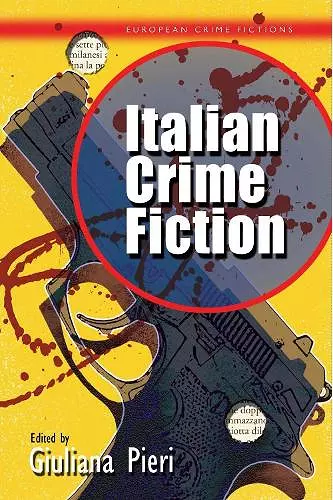Italian Crime Fiction
Format:Hardback
Publisher:University of Wales Press
Published:31st Oct '11
Currently unavailable, and unfortunately no date known when it will be back
This hardback is available in another edition too:
- Paperback£24.99(9780708324325)

The present volume is the first study in the English language to focus specifically on Italian crime fiction, weaving together a historical perspective and a thematic approach, with a particular focus on the representation of space, especially city space, gender, and the tradition of impegno, the social and political engagement which characterised the Italian cultural and literary scene in the postwar period. The 8 chapters in this volume explore the distinctive features of the Italian tradition from the 1930s to the present, by focusing on a wide range of detective and crime novels by selected Italian writers, some of whom have an established international reputation, such as C. E. Gadda, L. Sciascia and U. Eco, whilst others may be relatively unknown, such as the new generation of crime writers of the Bologna school and Italian women crime writers. Each chapter examines a specific period, movement or group of writers, as well as engaging with broader debates over the contribution crime fiction makes more generally to contemporary Italian and European culture. The editor and contributors of this volume argue strongly in favour of reinstating crime fiction within the canon of Italian modern literature by presenting this once marginalised literary genre as a body of works which, when viewed without the artificial distinction between high and popular literature, shows a remarkable insight into Italy's postwar history, tracking its societal and political troubles and changes as well as often also engaging with metaphorical and philosophical notions of right or wrong, evil, redemption, and the search of the self.
Over the last two decades, there has been a flowering in Italian crime fiction. Fascinating new work has been coming out, and crime novels have gained a mass audience for the first time. These novels have often been politically acute and fascinating in terms of their style and their urban settings. But until now no one volume has analysed this trend or put it in historical context. Italian crime fiction fills this gap with aplomb, with a wide-ranging series of highly readable essays written by acknowledged experts in a number of fields. This collection looks into the origins of Italian crime fiction in the 1920s and 1930s, the genius and influence of Giorgio Scerbanenco as well as the work of Eco, Sciascia, Tabucchi and Gadda. Essays also deal with key themes such as the South, women and the city of Milan. Backed up by an annotated bibliography, this is an essential collection for all those interested in this genre, as well as in Italian literature in general and the connections between crime, history, politics and the city. Professor John Foot, UCL There are few people better placed than Giuliana Pieri, Senior Lecturer in Italian and the Visual Arts at Royal Holloway, University of London, to edit this fascinating and insightful analysis of several decades of Italian crime fiction. It is notable (and perhaps regrettable) that, as yet, the remarkable and idiosyncratic talents of this branch of the crime fiction genre have not made the mark that their Scandinavian confreres have. But enthusiasm among non-Italian speaking readers is growing. Pieri and her contributors analyse with intelligence and enthusiasm the political insights and historical contexts freighted into the work of such writers as Sciascia, Eco and (of course) Andrea Camilleri. But along with the better-known names, much light is thrown on the strategies and achievements of writers yet to make their mark outside of Italy. Potential readers, however, should beware - this is a volume that will send you out to purchase all the authors herein, whether you are engaged in academic discipline or just seeking sheer narrative pleasure. Barry Forshaw, www.crimetime.co.uk
ISBN: 9780708324318
Dimensions: unknown
Weight: unknown
208 pages